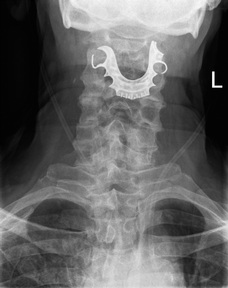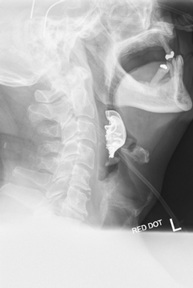Dentures and anaesthesia warning after 72-year-old swallows teeth during surgery
Doctors have warned that false teeth must be taken out before a general anaesthetic after a 72-year-old’s dentures got stuck in his throat during surgery.

As a result, the patient experienced unnecessary pain, bleeding, and swallowing difficulties, and needed additional hospital visits, invasive tests, blood transfusions, and eventually more surgery.
The patient’s false teeth went missing after surgery to remove a lump in his abdominal wall, but they weren’t discovered for several days, according to a case report in the British Medical Journal (BMJ).
‘No national guidelines on how dentures should be managed during anaesthesia’
The report warns that the presence of any false teeth or dental plates should be clearly documented before and after any surgical procedure. It further recommends that members of the surgical team are made aware of what is to be done with them.
One of the authors of the report said: “There are no set national guidelines on how dentures should be managed during anaesthesia, but it is known that leaving dentures in during bag-mask ventilation allows for a better seal during induction [when the anaesthetic is being infused], and therefore many hospitals allow dentures to be removed immediately before intubation [when a tube is inserted into the airway to assist breathing.”
It was thought that in this particular case the 72-year-old patient must have breathed in the dentures during an operation, and it was noted that this was not the first instance of dentures being swallowed whilst an anaesthetic had been given.

In the report, it detailed how the patient arrived at A&E complaining of blood in the mouth. He had experienced swallowing difficulties and pain which had prevented him from eating.
However, nothing in his test results prompted doctors to consider anything other than a respiratory infection.
Unaware of the real problem, doctors merely prescribed mouthwash, antibiotics and steroids, and the patient was duly sent home.
Two days later he returned with worsening symptoms. He had been unable to swallow any of the medicine he had been prescribed. He was admitted to hospital with a severe chest infection usually caused by inhaling food or stomach acid or saliva into the lungs.
Consequently, a diagnostic procedure was carried out to look at his throat and voice box which revealed a semi-circular object lying across his vocal cords; it soon became evident the object had caused internal swelling and blistering.
Patient noticed his false teeth had gone missing
Healthcare professionals explained to the patient how an unidentified object was showing up on his x-rays. The patient then mentioned that his dentures, which consisted of a metal roof plate and three false teeth, had gone missing during his previous hospital stay.
Emergency surgery was then undertaken to remove the dentures and he was discharged six days later but the patient reappeared at the hospital after further bleeding.
Further tests showed the patient had internal wound tissue around the site of the blistering. This was cauterised to prevent further bleeding, but because he had lost so much blood, he also required a blood transfusion. It was deemed the source of this bleed was a torn artery in the wound.
Checkups after this revealed that any damaged tissue was healing well and six weeks later the patient had not needed further emergency care and his blood count was normal again.
Latest News
 29-Jul-24
Dementia Bus gives carehome.co.uk staff insight into life with dementia
29-Jul-24
Dementia Bus gives carehome.co.uk staff insight into life with dementia
 01-Mar-24
Find out the top care homes in 2024
01-Mar-24
Find out the top care homes in 2024
 21-Mar-23
UK's top care homes in 2023 revealed
21-Mar-23
UK's top care homes in 2023 revealed
 03-Jan-23
carehome.co.uk launches free care helpline
03-Jan-23
carehome.co.uk launches free care helpline
 13-Dec-22
5 mins with Emily Whitehurst, chief operating officer for Constantia Healthcare
13-Dec-22
5 mins with Emily Whitehurst, chief operating officer for Constantia Healthcare